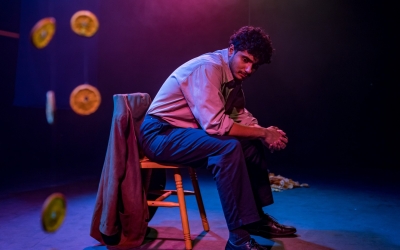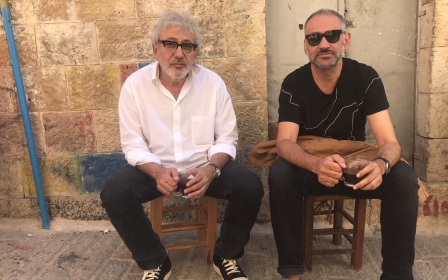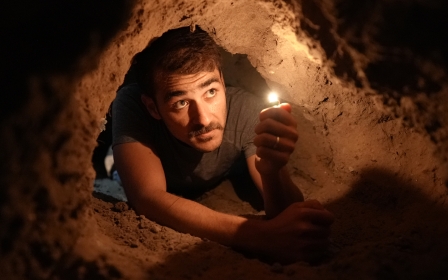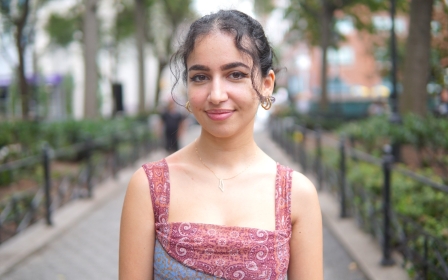The Dupes: A timeless story of Palestinians' pain and betrayal
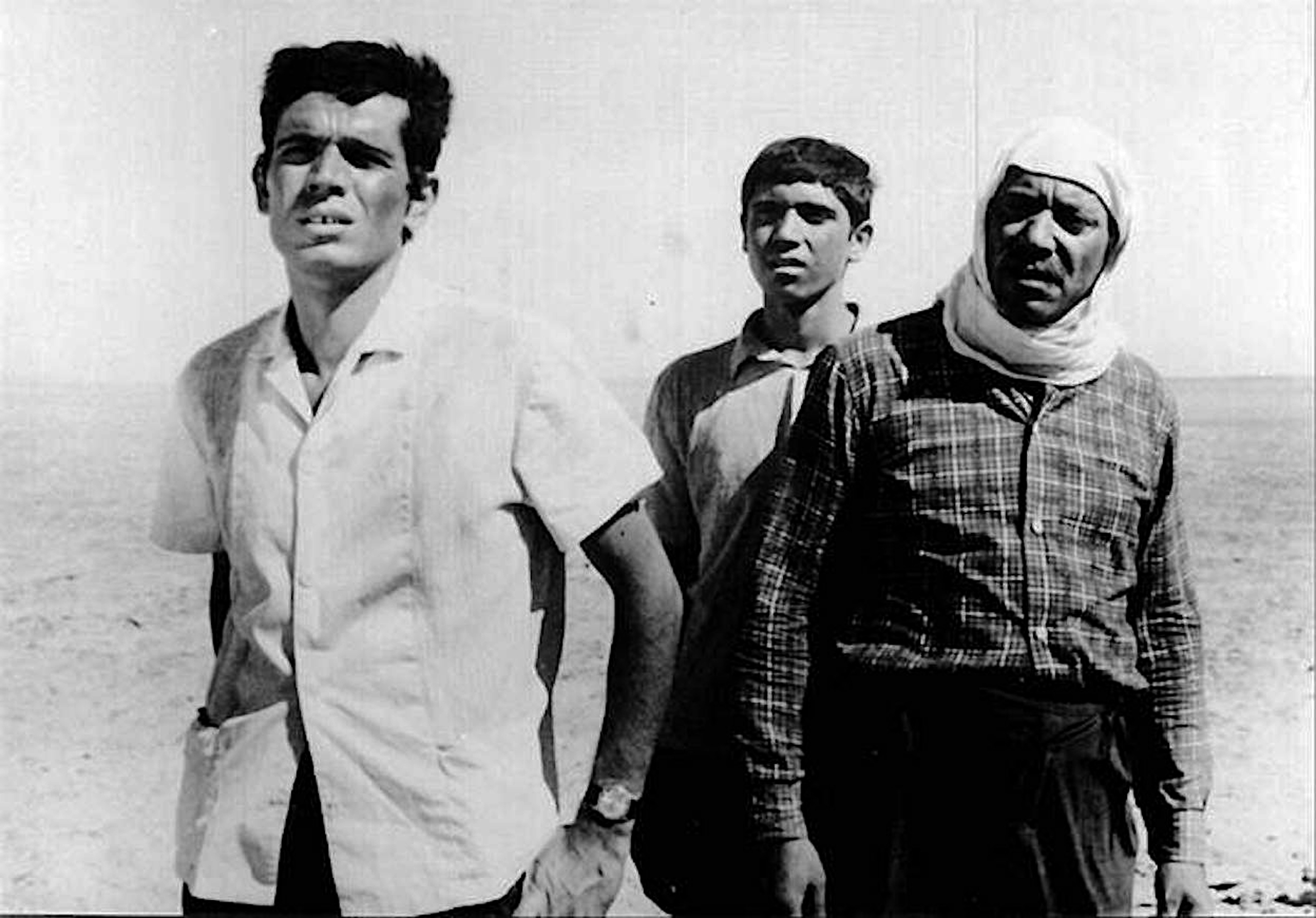
Palestinian journalists and doctors in Gaza have paid with their lives with targeted killings - like Al Jazeera journalist Shireen Abu Akleh who was killed by an Israeli sniper in Jenin in 2022 - for consistently showing the world the unspeakable cruelties of this new Nakba.
They both highlighted the lies of the Israeli narrative and the outrageous moral failure of Western and most Arab leaders.
Their indelible truth-telling, in the occupied West Bank too, makes them heirs of one of Palestine’s great artists, Ghassan Kanafani, who lives on 51 years after his assassination by Israel’s Mossad in Beirut.
Now is a good time to watch his film, The Dupes.
It's a masterpiece, depicting the post-Nakba life of Palestinians in exile, by Egyptian director Tewfik Salah, directed 50 years ago in Syria, and banned for decades.
Stay informed with MEE's newsletters
Sign up to get the latest alerts, insights and analysis, starting with Turkey Unpacked
In its time, it was too stark a portrait of the Arab world’s betrayals of Palestine’s 700,000 refugees forced from their country in 1948.
But the film has just as powerful a resonance in today’s world where Palestinians’ lives of pain, injustice, violence, and deprivation are normalised, just as they were then.
Follow Middle East Eye's live coverage for the latest on the Israel-Palestine war
The Dupes is based on Kanafani’s iconic novel, Men in the Sun, set in the 1950s and published in 1962.
Salah was unable to get sufficient support in Egypt for making the film and eventually left for Damascus, where he collaborated with some great actors from a rich artistic milieu, notably Bassam Lotfi Abu Ghazaleh, a Palestinian refugee from Tulkarem, and Syrians Mohamed Kheir-Halouani, Abdul Rahman al Rashi, Saleh Kholoki, and the cinematographer Bahgat Heidar.
The film originally came out in 1972 and was shown at festivals in Moscow and Tunis. Salah died 10 years ago.
The restored version shown at the London Film Festival was the meticulous work of many hands: the Film Foundation’s World Cinema Project and Cineteca di Bologna, in collaboration with Salah’s family and the National Film Organisation, with funding from the Hobson/Lucas Family Foundation.
The film takes place in the 1950s and centres on three Palestinian men’s lives as refugees in Iraq.
All of them are destitute, desperate, and in shock from the recent destruction in 1948 of their previous lives in Palestine.
They are from three generations and have met by chance in Basra, each looking for a smuggler’s route across the desert to Kuwait where they believe they will find work.
Crushed
The film uses long flashbacks to build up the characters and the past and present lives of each of them so vividly that we know them and identify with them and the life trauma they are struggling through.
The oldest, Abu Qais, is crushed by the loss of his beloved land, which was his identity, along with shame at the impotence of poverty of life in a refugee camp.
Assad, probably in his early thirties, borrows 50 dinars from his uncle to make the journey to find work and a future. The loan comes with an agreement to marry the uncle’s daughter, which he has no wish whatever to do.
Brief glimpses of the girl and her mother as the two men make the deal show their own desperation at the cul de sac of their refugee life. The girl brings him a cup of coffee with a shy, quick smile, showing how much she hopes that perhaps Assad will like her, and can be a future for the family.
Assad is immediately tricked by the first smuggler he tries, and is left stranded in the desert having paid over half his dinars. He makes his way back to start again, extremely wary.
The third man, Marwan, is only 16 and a schoolboy bent on studying to become a doctor. His older brother is in Kuwait and has been sending the family money every month to support his father, mother, and five children in a miserable shack.
But he has sent Marwan a private letter telling him he has got married and won't be sending any more money, and he should not tell his parents, but stop going to school and take on the burden of supporting the family.
Marwan’s father, who constantly complains bitterly about his living conditions, and is vile to his wife, then abruptly deserts the family.
He has been offered the chance to marry a woman who has lost a leg and never found a husband. Her father is willing to give a house to the potential husband. For Marwan’s father, to have a house with a roof again and a room he can rent out for an income is a chance he does not hesitate to seize.
The fourth key character is Abdul Khaizuram, a Palestinian truck driver who bargains hard with the three to drive them to Kuwait.
Assad bargains fiercely, he will not pay until they arrive. Khaizuram’s background too emerges in flashbacks on the long empty road in the burning heat.
He was a freedom fighter, captured and castrated in 1948, tears running with the sweat on his face as the image of the operation comes into his mind after one of the men asks him if he is married. "Better to lose your manhood than your life," the surgeon told him.
He ends up doing a humiliating, hard job, driving back and forth alone across the harsh desert for a rich man in Kuwait, and dreaming only of money, ready to take small sums from fellow Palestinians risking their lives for the chance of the dignity of work.
Horrible moment of inhumanity
The four rattle over the desert, Abu Qais in the passenger seat and the other two on top, hanging on, with no protection from the sun, with wind and sand coating their hair and faces. They know they will have to get into the truck's stifling steel tank twice as it crosses the border posts, while the driver insists it will not be for more than six or seven minutes each time as his papers are checked.
At the first stop, he climbs up to open the tank hatch, briefly dips his face in, and tells them to take their shirts off. The tension between him and the three others is palpable as they search each others’ faces, knowing there is no turning back.
They lower themselves in and the top is sealed. At the border, Abul Khaizuram runs from one office to another getting signatures from the guards, all of whom know him well.
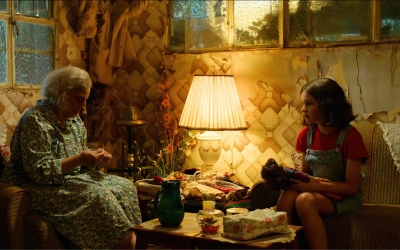
When he stops at a distance in the desert and unlocks the hatch he has to drag each man out slowly. They are in their underpants, limp, all dignity gone. They fall onto the ground in the shade of the truck, absolutely shell-shocked, weakly contesting his assertion it was only eight minutes.
Abul Khaizuram tries to hurry them to get going, takes a huge drink himself from a water bag, and pours the rest over his head and body as they watch him. It is a horrible moment of inhumanity. He then abruptly says that Marwan can squeeze into the passenger seat with Abu Qais, as they are both thin.
The atmosphere, aided by the subtle music of Solhi el-Wadi grows more and more tense as they approach the second border and the three know only too well what awaits them as they slide back inside the tank half-naked.
Three smug Kuwaiti border guards, in their cool office, enjoy teasing the sweating Abul Khaizuram about how his rich boss has asked six times for news of his whereabouts and knows he was dallying with a prostitute in Basra, and they want to meet her too.
The minutes pass as tension and desperation mount and they hold his papers just out of reach as they mock him. A shot meanwhile shows the truck outside and there is the sound of banging from the tank. No one hears it.
Hopeless plea
In the last minutes of the film, Abdul Khaizuram flings a small bundle of clothes from the truck window.
Then Salah shows the final indignity of the three men, in their underpants on a rubbish dump in the desert. Abu Qais’s rigid body has his arm stretched upwards in a last hopeless plea.
Kanafani in his life and work was a man whose 'banging on the tank' was heard and still is
The novel’s last words are: "Why didn’t you knock on the sides of the tank? Why didn’t you bang the sides of the tank? Why? Why? Why?"
Kanafani in his life and work was a man whose "banging on the tank" was heard and still is, both in his books and in the bright life-filled kindergartens in several of Beirut’s refugee camps, run by his widow, Annie Kanafani.
He was a spokesman for the Popular Front for the Liberation of Palestine and was assassinated by a Mossad car bomb, with his teenage niece Lamees Najim in Beirut in 1972.
His obituary in Lebanon’s Daily Star stated that "he was a commando who never fired a gun, whose weapon was a ball-point pen, and his arena the newspaper pages".
The views expressed in this article belong to the author and do not necessarily reflect the editorial policy of Middle East Eye.
Middle East Eye delivers independent and unrivalled coverage and analysis of the Middle East, North Africa and beyond. To learn more about republishing this content and the associated fees, please fill out this form. More about MEE can be found here.



